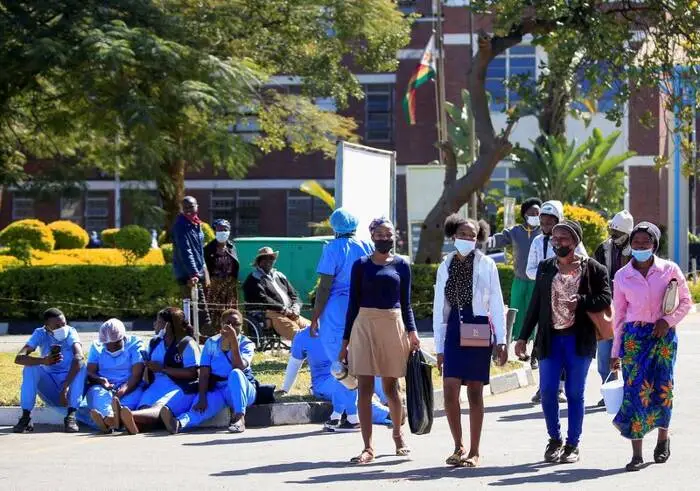简体中文
繁體中文
English
Pусский
日本語
ภาษาไทย
Tiếng Việt
Bahasa Indonesia
Español
हिन्दी
Filippiiniläinen
Français
Deutsch
Português
Türkçe
한국어
العربية
Zimbabwe health workers strike after rejecting 100% pay rise
Abstract:Zimbabwean health workers went on strike on Monday after rejecting a 100% wage hike offer last week, pressing their demand for payment in U.S. dollars as the local currency slumps.
Zimbabwean health workers went on strike on Monday after rejecting a 100% wage hike offer last week, pressing their demand for payment in U.S. dollars as the local currency slumps.

Zimbabwe‘s main nurses’ union urged the government to negotiate and warned that lives would be lost if the dispute was not resolved quickly.
The government and health workers are at an impasse after inflation jumped to 131.7% in May, a grim echo of the hyperinflation that wiped out peoples savings a decade ago.
Government workers rejected the below-inflation 100% wage hike offer on Friday.
At Sally Mugabe Hospital in Harare, patients seeking treatment sat in the courtyard while doctors, nurses, radiographers and pharmacists left their workplaces to protest.
“The salaries that the health workers received last week were pathetic,” Enock Dongo, head of the Zimbabwe Nurses Association, told Reuters, adding that the majority were paid 20,000 Zimbabwe dollars ($53) a month.
He said health professionals across the country had decided to strike until they were paid US$540 a month, the pay they used to receive in 2018 before the local currency slumped.
Kindness Paradza, the deputy minister of Information, Publicity and Broadcasting Services, said the government was trying to find “a positive solution” to the standoff, against a backdrop of economic challenges faced by the country due to sanctions.
Zimbabwean authorities blame the sanctions imposed by the United States and European Union since 2001 for the economic ills plaguing the southern African nation.
President Emmerson Mnangagwa, who took over from longtime leader Robert Mugabe in a 2017 coup, has struggled to end an economic crisis that started under his predecessor.
($1 = 378.0000 Zimbabwe dollars)
(Reporting by Nyasha ChingonoEditing by Nick Macfie and Bernadette Baum)
Disclaimer:
The views in this article only represent the author's personal views, and do not constitute investment advice on this platform. This platform does not guarantee the accuracy, completeness and timeliness of the information in the article, and will not be liable for any loss caused by the use of or reliance on the information in the article.
WikiFX Broker
Latest News
Japan to Take Action to Stabilize the Yen
Ringgit Remains Flat Amid Holidays, US Debt Concerns Loom
Taurex: Is it Safe to Invest?
Vietnamese Police Bust $1.2 Million Crypto Fraud Case
WikiEXPO Global Expert Interview: Loretta Joseph——Unlock the forefront of digital finance
Malaysia’s Securities Commission Enforces Ban on Bybit & Its CEO
Will Gold Shine Brighter in 2025?
Will Inflation Slow Down in the New Year 2025?
The WikiFX 2024 Annual User Report is here! Come and claim your exclusive identity!
SCAM ON SCAM: New Tactic Used by Scammers
Currency Calculator


